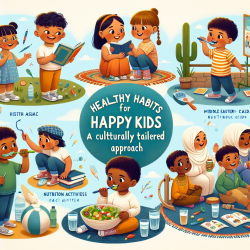Introduction
In the quest to create healthier futures for children, the role of culturally relevant interventions cannot be overstated. A recent study, "Adaptation of a Culturally Relevant Nutrition and Physical Activity Program for Low-Income, Mexican-Origin Parents With Young Children," sheds light on effective strategies for addressing childhood obesity in high-risk communities. This blog will explore how practitioners can leverage these findings to enhance their practice and encourage further research.
The Challenge
Latino children in the United States face higher rates of obesity compared to their non-Latino peers. This condition predisposes them to various chronic diseases, including type 2 diabetes and cardiovascular issues. The study emphasizes the importance of family-centered interventions that incorporate culturally tailored messages, parenting skills, and supportive social environments.
Key Findings
The research highlights the success of the Niños Sanos, Familia Sana (Healthy Children, Healthy Family) program, which targeted Mexican-origin families in California's Central Valley. The program's culturally adapted approach included:
- Qualitative research to tailor obesity prevention messages.
- Pilot testing and implementation of key messages during family nights.
- Continuous modification to incorporate culturally innovative elements.
Of the 238 families enrolled, 53% attended the recommended minimum of five classes during the first year, showcasing the program's reach and engagement.
Implementing the Findings
For practitioners, the study offers valuable insights into developing and implementing culturally relevant programs. Here are actionable steps to consider:
- Engage the Community: Collaborate with local leaders and community members to tailor interventions to the unique cultural and social contexts of the target audience.
- Focus on Family-Centered Approaches: Design programs that involve the entire family, emphasizing shared goals and collective efforts in achieving healthier lifestyles.
- Utilize Culturally Relevant Messaging: Craft messages that resonate with the cultural values and experiences of the community, ensuring they are relatable and actionable.
- Leverage Data for Continuous Improvement: Collect and analyze data to assess the effectiveness of interventions and make necessary adjustments to enhance outcomes.
Encouraging Further Research
While the study provides a robust framework for culturally tailored interventions, further research is essential to refine these approaches and expand their applicability to diverse communities. Practitioners are encouraged to explore:
- Longitudinal studies to assess the long-term impact of culturally tailored interventions.
- Comparative studies across different cultural groups to identify universal strategies and unique adaptations.
- Innovative methodologies for engaging communities and sustaining behavior changes.
Conclusion
By integrating culturally relevant strategies into practice, practitioners can play a pivotal role in combating childhood obesity and fostering healthier futures for children. The Niños Sanos, Familia Sana program serves as a model for how community engagement and cultural adaptation can lead to meaningful outcomes.
To read the original research paper, please follow this link: Adaptation of a Culturally Relevant Nutrition and Physical Activity Program for Low-Income, Mexican-Origin Parents With Young Children.










